Listening is tricky. It seems to be such a natural thing to do, but how often are we really deeply listening to understand the other? And how often do we listen only to speak ourselves? Or pretend to listen?
Karen Kimsey-House, in her famous book Co-Active Coaching introduces 3 levels of listening:
- Level 1: Internal Listening
- Level 2: Focused Listening
- Level 3: Global Listening
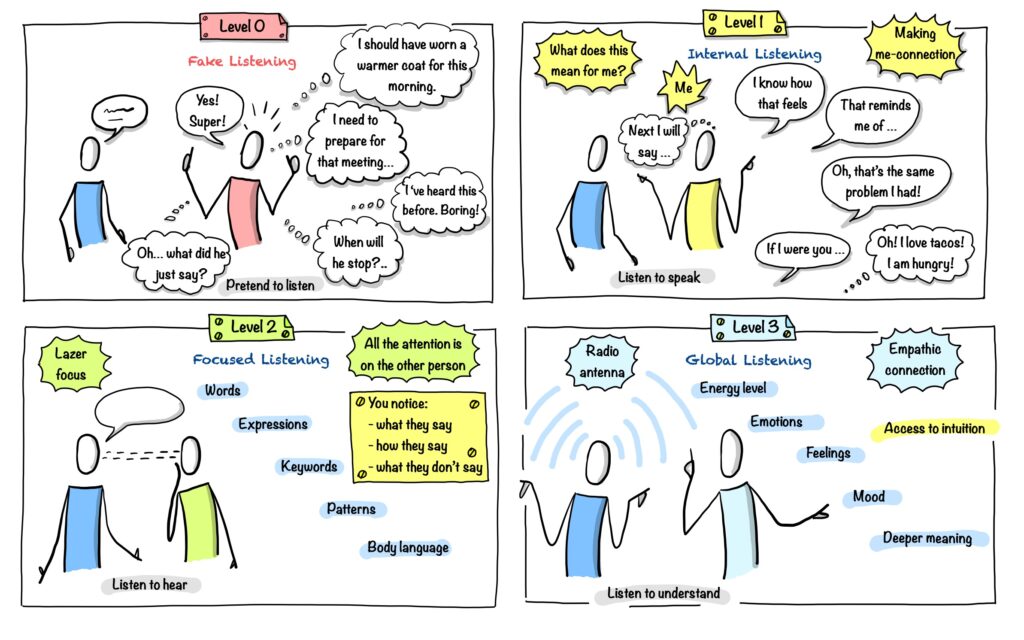
In addition to this, we might consider one more level of (non-)listening – Fake Listening.
Level 0: Fake Listening
Fake Listening is when we are just pretending to listen while actually thinking about something totally different and not anyhow connected to what we are listening to currently. We might be totally bored and not interested at all in what we pretend to listen to, or we might be in a hurry, and this conversation is preventing us from moving to the activities we have to deal with. So we might nod, smile and use visual cues from “active listening” techniques, while in our thoughts, we are far away from our conversational partner and their message.
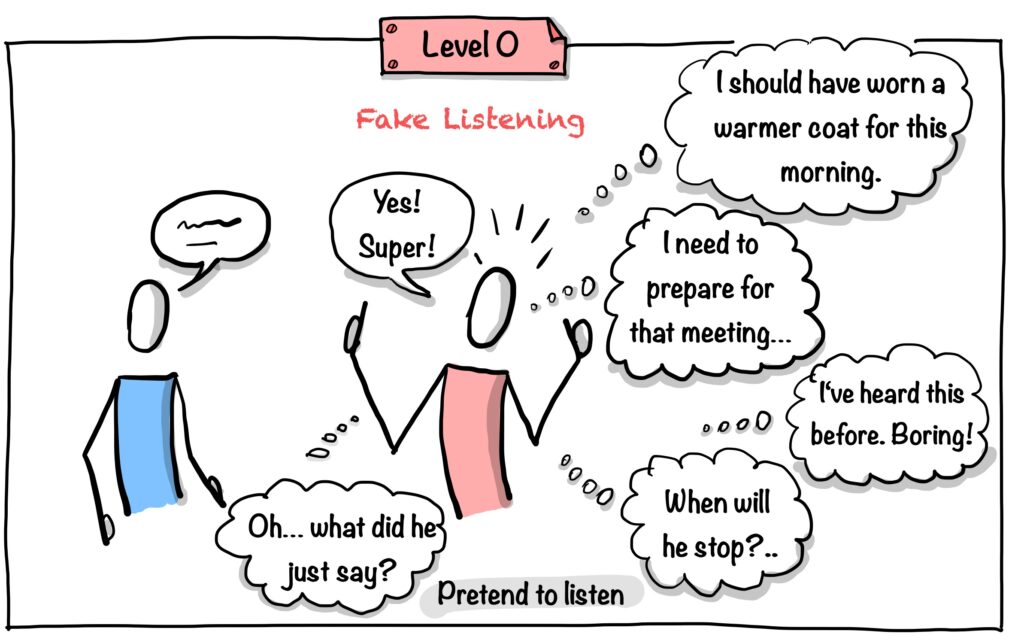
We are routinely using this fake listening style in communication with our children, and they get used to this absent-minded look in our eyes, gradually realizing what it means (as well as starting to doubt the value of their message and themselves), and eventually, they stop sharing their excitements and worries with us. When we grow up and gain more experience, most of us learn to recognize the situations when the other side just pretends to listen, and such behavior creates huge damage to the relationship with such a person, as our respect and trust drop drastically.
But what to do if you really don’t have time to listen now and can not concentrate on what your partner is saying? Honesty probably could be the best thing in this situation, just say that you don’t have time right now and propose another time to continue, whenever it is possible, and do so for real so that it would not sound like an excuse. It will help a lot for your long-term relationship with this person, as they will know that when the two of you are talking, you are really listening.
And what if it is really boring for you? Well, it might still be worth making an effort, being more curious and somewhat humble, and becoming really focused on what other people are talking about, and you might be surprised to discover new and interesting things, as well as training your ability to listen deeply.
Level 1: Internal Listening
The next level, Internal Listening, is already some kind of listening, when we do hear some of the things that our speaking partner is talking about, but only some, as most of the time, we are actually thinking about how it relates to us and what we should say next. So instead of listening, we are trying to steal the focus and speak ourselves and about ourselves. And with this focus on ourselves, we sometimes might switch completely to our thoughts and stop listening, falling to Level 0.
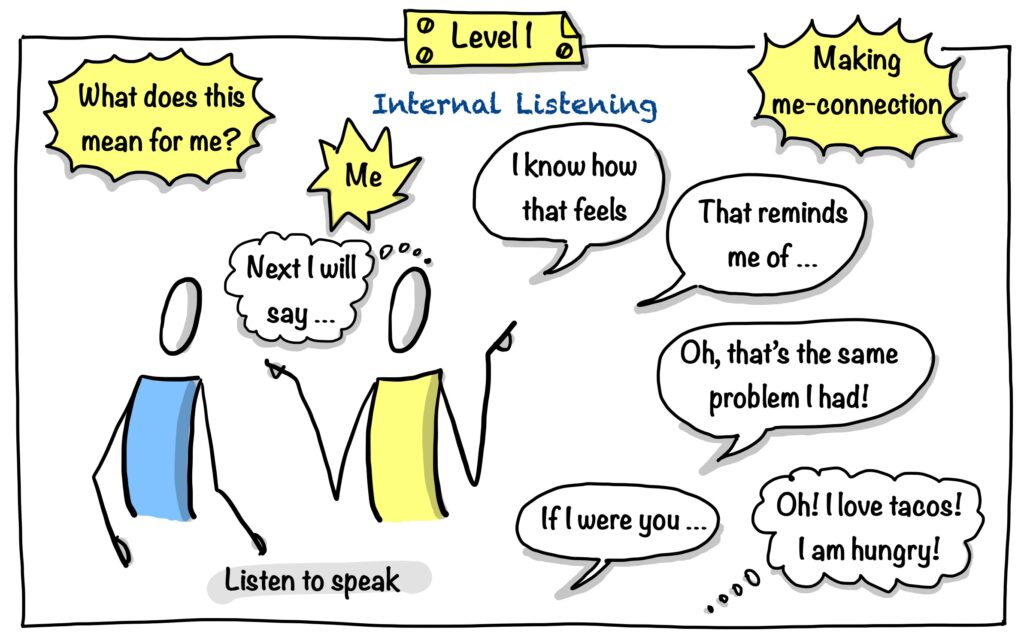
How do our partners feel in this situation? Most of us have been there, so it is easy to recollect these feelings. While it might be entertaining and interesting in the beginning, as getting insights and thoughts about other person experiences might be good and useful, soon it starts feeling like hijacking and neglecting us and our thoughts, especially when we realize that our partner does not really care about what we are talking and use it only to jumpstart their own show.
Is Internal Listening always bad, and should we never talk about ourselves? No, there are situations when it is appropriate and even needed. When we are at a doctor’s office or at coaching sessions as a coachee, it would be strange and kind of stupid to move focus to our doctor or coach and become really curious about them. Those sessions are supposed to be about us, and the more self-connections and reflections we do, the better the results.
Or when we talk with our friends, we do need to talk sometimes about our experiences and share our thoughts to be interesting as conversational partners and to be a source of some insights, information, or just fun. Talking about ourselves, our personal life, our challenges and failures also creates trust and helps build relationships. If we never do this, our partners might feel uncomfortable and get suspicious about our intentions. However, the reality is that we usually talk way too much about ourselves and for many of us the main challenge is doing it less.
Level 2 – Focused Listening
When we listen to hear, all our focus and attention are on the other person, their thoughts, ideas, worries, and joys. We do notice what they say, how they say it, and what stays unsaid. We are genuinely curious about them and listen to them deeply.
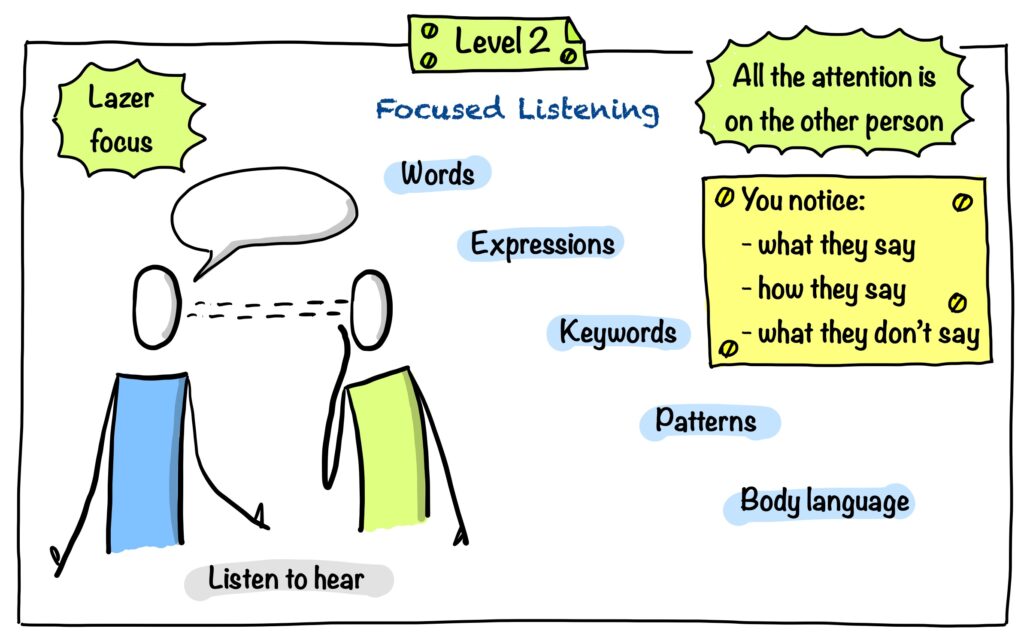
Our focus might sometimes slip back to us and our own thoughts, it is a natural process, and we need just to catch ourselves when it happens and come back to focused listening as soon as possible. It would be totally ok if we admit to our partner that our thoughts accidentally went away while they were talking and to ask them to repeat what we have missed. It might feel awkward, but in reality, it shows a lot of respect and how important it is for you what your partner is saying, and it raises the level of trust.
Level 3 – Global Listening
At Global Listening level we act like a radio antenna, perceiving all the bits of information as though they would be radio waves, with all our senses and with the whole self involved. We don’t only get the message but also feel the energy level, emotions, feelings and a deeper meaning behind what has been communicated. We create an empathic connection with our partner.
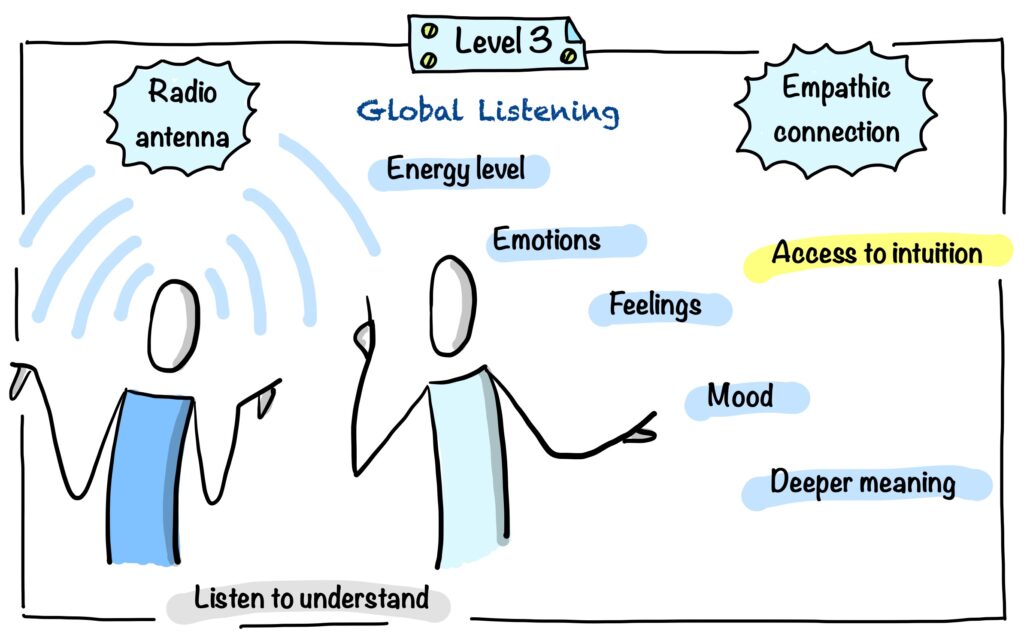
It might feel like a mystical experience, how much and to which extent we are suddenly capable of understanding the other person. This happens because we get access to our intuition. We start noticing all the micro-signals, not fully realizing it, mostly on some sub-conscious level, but due to our experience, we understand the meaning of what happens.
This requires long hours of disciplined practice of listening, with our full attention on the other person, until we are able to have this access to your intuition. We can train this skill all the time in our everyday life, with all types of people, including those that we perceive to be boring, by being genuinely curious about them. We will not only learn new things but also will level up our abilities to listen, to understand other people and to get access to our intuition.
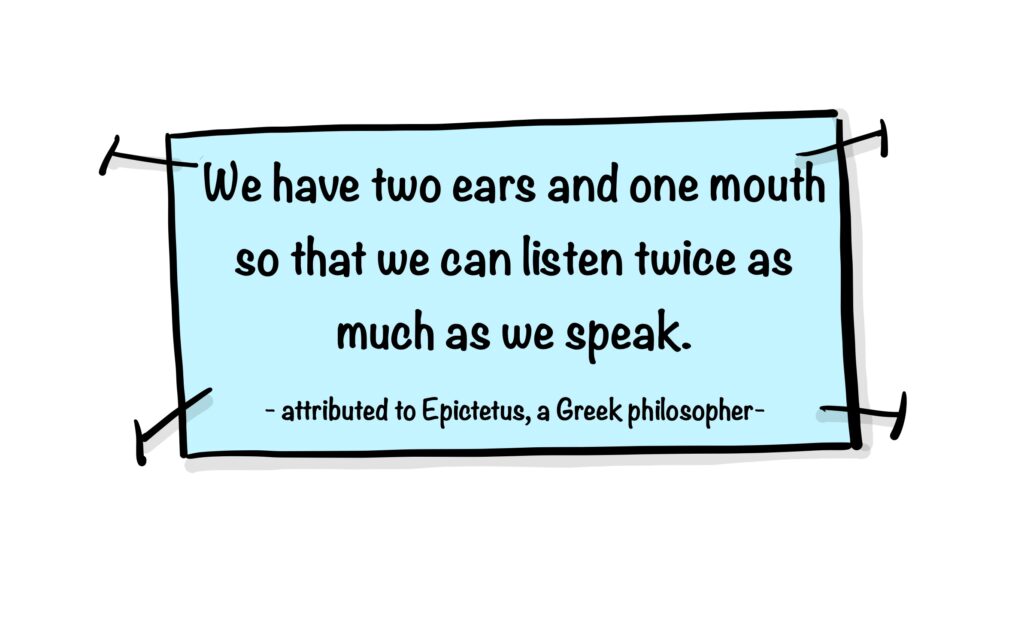
You can read more about levels of listening Karen Kimsey-House’s book Co-Active Coaching
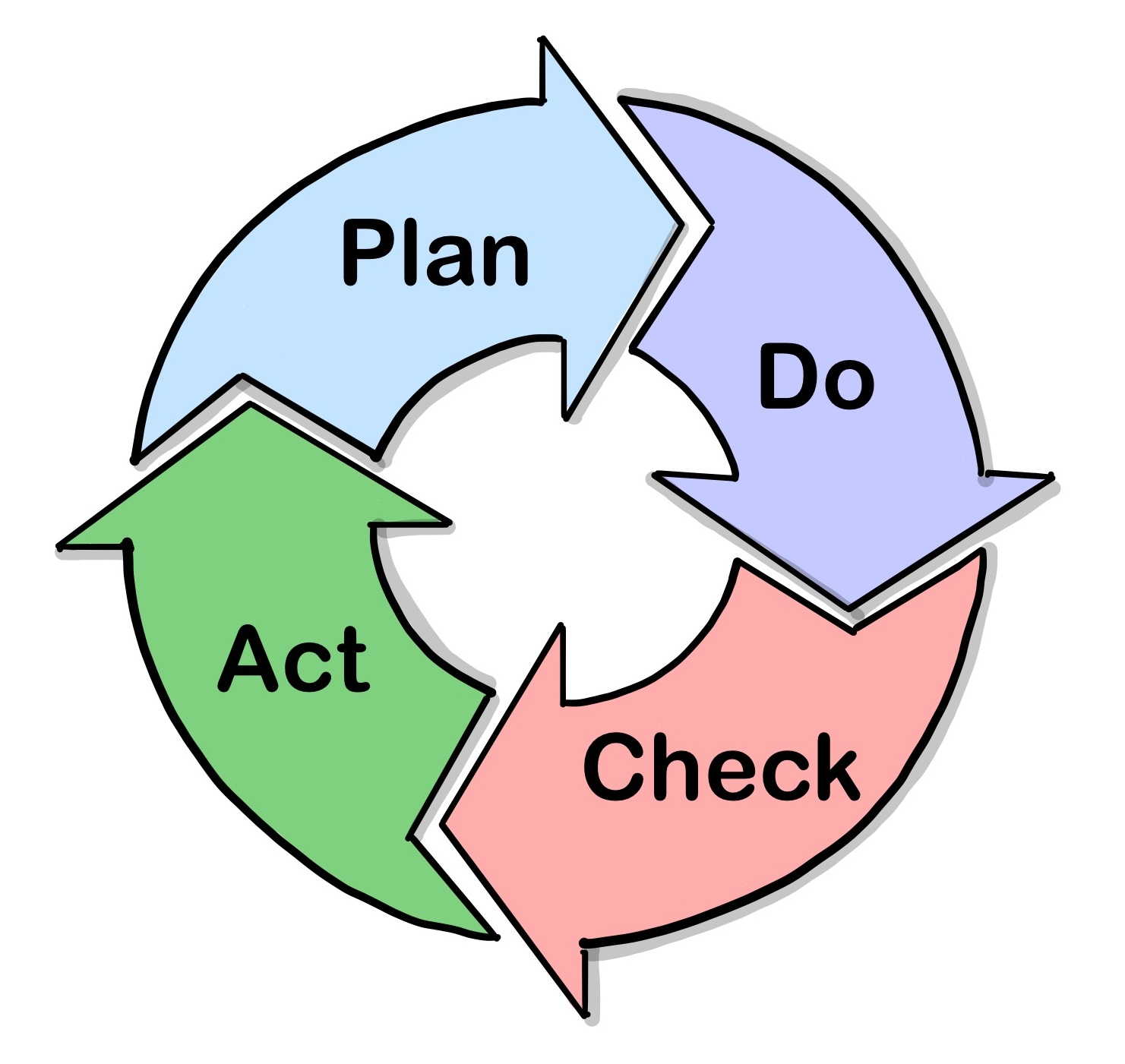
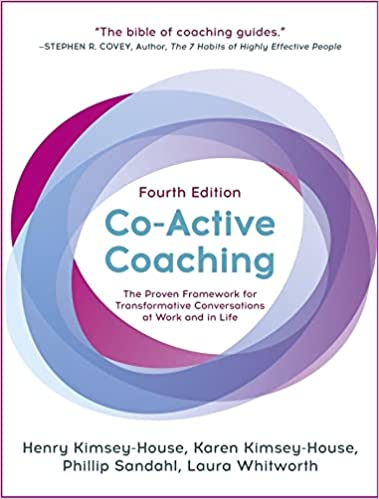
Leave a Reply